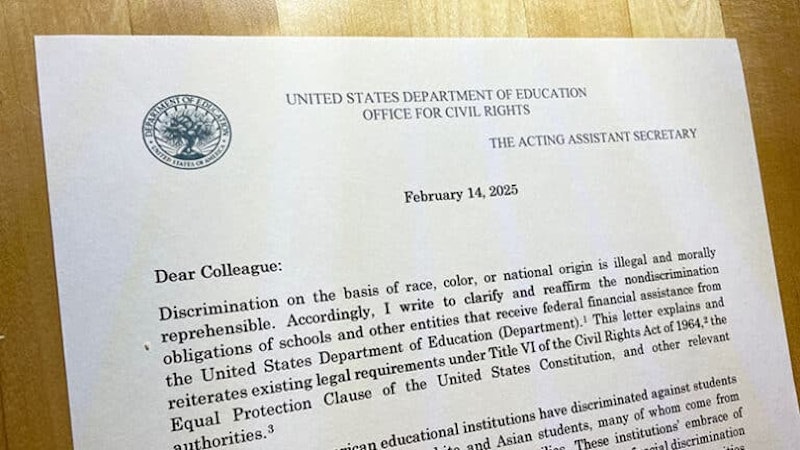On Valentine's Day, the US Department of Education's office of civil rights issued a letter addressed "Dear Colleague," and meant for virtually every higher education administrator in America. "In recent years, American educational institutions have discriminated against students on the basis of race, including white and Asian students, many of whom come from disadvantaged backgrounds and low-income families," said the document, which was signed by Craig Trainor, the acting assistant secretary of education for civil rights. "These institutions’ embrace of pervasive and repugnant race-based preferences and other forms of racial discrimination have emanated throughout every facet of academia."
The letter condemns as "nebulous" such goals as "diversity" and "social justice." And it purports to prohibit "indirect" efforts to achieve diversity, such as reading admissions essays for signs of racial identity or de-emphasizing standardized test scores as a criterion for admission or financial aid. (The letter's claim that it would be "unlawful" to drop standardized testing as a criterion for admission on the grounds that the tests are discriminatory is particularly surprising. We seem to be returning to a raw numerical conception of “merit.”)
College administrators and Democratic politicians have expressed themselves as being flummoxed. One stunner of a question is whether historically black institutions can operate under the new dispensation, or whether their mere existence amounts to illegal discrimination according to Trainor and co. More generally, to say that this puts a crimp in the routine operations of colleges as they stand right now is an understatement. Many or even most private colleges have defined their own missions in terms of diversity and social justice. Now they must feel awfully "nebulous" and, more pointedly, awfully defunded.
However, private colleges and state universities aren’t federal agencies. Private colleges are run by their trustees, while state universities are funded largely by state legislatures. Not only that, but the Department of Education seems like it's about to expire. A college administrator, it seems, could just ignore Trainor's thrashing about and do what she thinks is right.
But the simple fact is that almost all American colleges and universities receive substantial federal funding. In 2022, the federal government provided some $54 billion in grants for research alone. A typical case: In 2023, 61 percent of the University of Texas at Austin's $1.06 billion research funding came from federal sources. And the total federal support across the sector, including for financial aid and other initiatives, is close to $200 billion annually.
And American colleges have become dependent on this funding, which ballooned during the Cold War for weapons and other defense research. Meanwhile, institutions such as the Kennedy School of Government at Harvard, or George Mason University as a whole, function among other things as places of employment for officials of whatever party’s out of power at the moment. US higher education is intertwined with the federal government in a thousand places and in a thousand ways.
What has become evident is that American higher ed is de facto a public system, that roughly every college in the country can be controlled right now by the Department of Education (and after that winds down, directly by the White House staff). This is likely to have transformative and immediate effects on most of these institutions. American higher education, by making itself dependent on federal funding, by accepting all this welfare, by associating itself relentlessly with "the establishment" and with political power, has rendered itself radically vulnerable, to the point where its mission and values can be changed over the course of a weekend with the wave of an official's hand.
When you spend taxpayer dollars in a democracy, the way you spend them is a legitimate political question. If you’re spending their money, then voters get a say in...who's running your college and what they are teaching in its classrooms. When there’s a political transformation in the society as a whole—for example a sudden swing right—you'll have to transform everything you're doing.
And if you want to be independent of political exigencies or oversight by partisan politicians with whom you strongly disagree, you'll have to do without government funding.
There are a few colleges that refuse to take federal funds, though these are small religious or directly politically-associate institutions such as Hillsdale or Grove City College. Perhaps the new University of Austin, meant as a haven of free speech and (possibly) conservative politics, can make do without federal grants. As all the other campuses get set to reverse their missions by Thursday and be annexed by the Republican Party, they might want to send some of their administrators to these little religious campuses to study their funding strategies.
Because for institutions of higher education to serve the federal government in its curriculum and administrative procedures, to put higher education in the service of political power, is incompatible with its most basic purposes. It’s incompatible with faculty governance, for example, and with academic freedom. It turns your university into a nexus and propaganda and disinformation. That is exactly what people like JD Vance have said about places like Yale for a long time: that they’ve been turned into political tools by progressives, and by formerly mainstream Republican politicians of the Bush variety.
It’s understandable that the populists, outraged by the political slant of American higher education, want vengeance. But what they're doing now, using the leverage of federal dollars to create a politically uniform system of public higher education across the whole country, is more of the same or perhaps even worse.
—Follow Crispin Sartwell on X: @ CrispinSartwell

